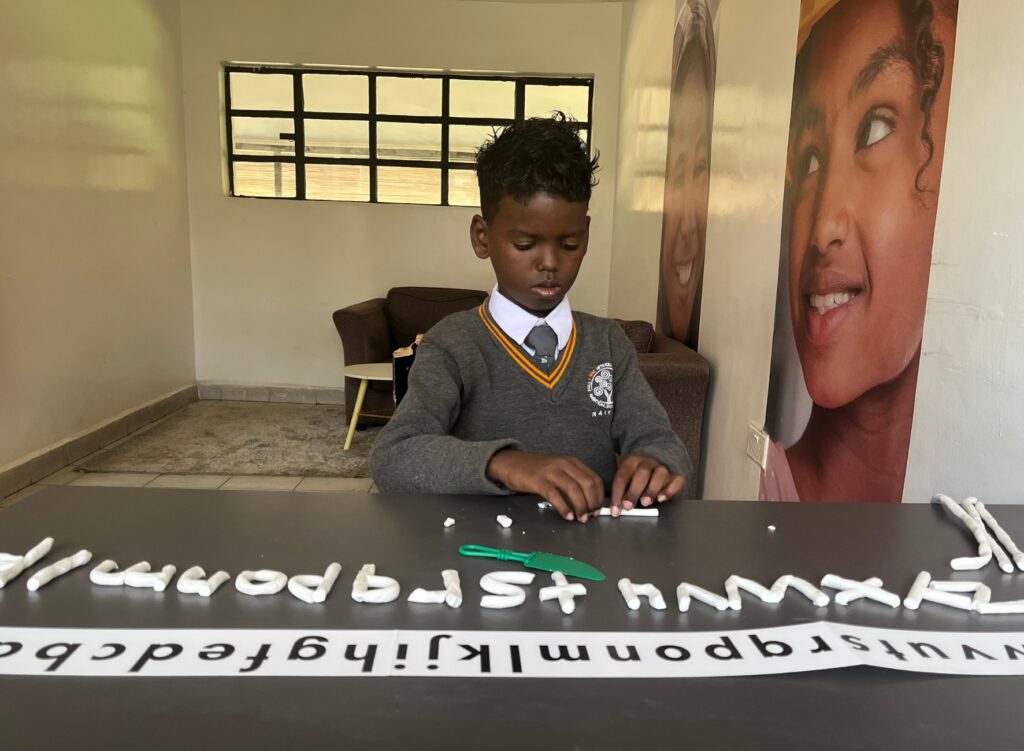

By Cathie Geraci, Davis® Facilitator
When people ask me what I do, I tell them: “I help individuals understand how their intelligence works.” Yes, I help dyslexics learn to read, dyscalculics understand math, ADHDers manage attention and behavior, and autistic individuals make sense of the world around them. But ultimately, my clients discover how their thinking style holds strengths—and how it has also created challenges in learning and understanding.
Until recently, all my clients came from families who had their needs met. Families with the time to focus on a child’s learning struggles. Families with the resources to seek help.
But there are approximately 15 million children living in refugee camps worldwide, and fewer than half attend school. Among those who do, neurodiverse students often cannot learn effectively. Imagine growing up in a refugee camp, finally receiving the chance to learn, only to find that your brain won’t let you. It’s a double injustice. These children—some of the most vulnerable neurodiverse learners anywhere—are the ones I had the privilege to work with.
Let me tell you about Still I Rise International School.
Located in the heart of the Nairobi slums, it serves vulnerable children and refugees. Most students are local; they arrive each morning from the slums and return home each evening. A smaller group boards at the school, having come from the Kakuma Refugee Camp in Kenya or from Still I Rise emergency schools in Yemen and Congo.
This school is extraordinary. Walking through its gates, you might think you entered an elite Kenyan private school: well-kept grounds, lush gardens, a swimming pool, after-school clubs. But what truly makes it special is not that it serves slum communities and refugees, nor that it is entirely free. It is the only free school in the world for vulnerable and refugee students that offers the International Baccalaureate curriculum.
I met the school’s founder, Nicolò Govoni, in November 2024 while he was presenting his book Un Mondo Possibile. I asked whether he had dyslexic students and mentioned that I thought I could help. One year later, I found myself at the school facilitating two Davis Mastery for Dyslexia® programs.
Ryan is 13 and lives in the slums with his mother and sister. His life is marked by extreme economic instability, yet nothing escapes his extraordinary visual-scanning ability. He is curious, thoughtful, and passionate about fencing. Despite being at the school for several years, he struggled with reading comprehension, writing, focus, and daily behavioral challenges.
After one week together, Ryan is now reading at grade level, writing comfortably—even in cursive—and maintaining focus. Most importantly, he now recognizes when he is the source of both his positive and negative behaviors. I am confident that in the months ahead, Ryan will become the student he wants to be, moving steadily toward his dream of working in cybersecurity.

Yaya is 12 and comes from the Kakuma Refugee Camp. He left Ethiopia at age five and has spent most of his life in the camp. He is curious, kind, determined, and dreams of becoming the President of Ethiopia one day—to solve his country’s problems. Since arriving at the school just ten months ago, he has had to learn English, math, and reading all at once.
Although naturally gifted in math, Yaya could not yet read. He had developed many clever strategies to guess words and make it appear as though he could read. His motivation, however, was remarkable. By lunchtime on the final day of his program, something “clicked”—the mechanism for reading finally activated. I am confident he will be reading independently within months and soon be as strong in every subject as he is in math.
My time at Still I Rise International School was transformative. For these two students, it marked the beginning of understanding how their intelligence works and the end of the barriers that once held them back. I hope this is only the start of helping many more students there.
For me, it was a masterclass in human resilience. These students possess extraordinary motivation and remain connected to joy, despite having endured some of the harshest conditions on Earth. So while I helped two students understand their intelligence, the students of Still I Rise taught me how to be a better human being.
If you feel inspired to learn more, please visit www.stillirise.org.